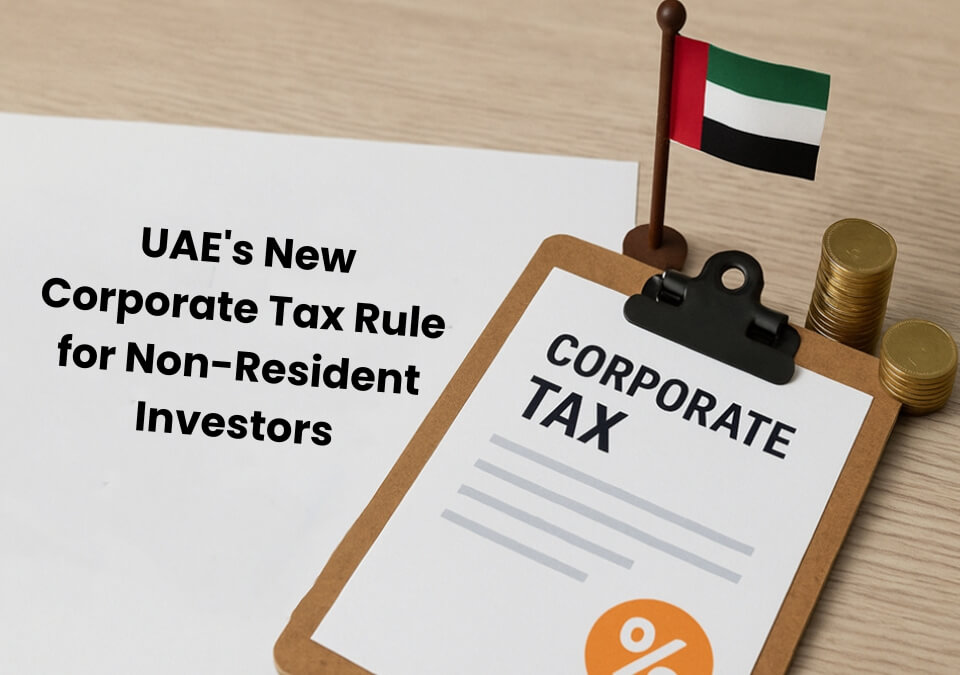
In the ever-evolving landscape of international tax compliance, staying ahead of regulatory changes is important. Recently, the UAE Ministry of Finance clarified a new Corporate Tax Rule that defines when a foreign or non-resident investor has a ‘taxable presence’ in the country under the Corporate Tax Law. This replaces the previous Cabinet Decision No. 56 of 2023, and it’s one that investors, tax advisors, and fund managers alike should pay attention to.
While tax updates aren’t typically cause for celebration, this one brings a healthy dose of clarity, especially for those investing in Qualifying Investment Funds (QIFs) or Real Estate Investment Trusts (REITs). Let’s explore what this means in practice and how to stay on the right side of the rules.
New Corporate Tax Rule Essentials: What Has Changed?
The new UAE tax decision establishes specific criteria under which a non-resident investor in a QIF or REIT will be considered to have a tax nexus or taxable presence in the UAE. This is especially relevant for non-resident juridical investors (i.e., foreign companies or legal entities).
In simple terms, if certain thresholds related to income distribution or ownership diversity are not met, the UAE considers the investor to have a taxable footprint in the country.
This decision aims to improve transparency while ensuring the UAE continues to be a globally attractive investment destination. It also aligns the country’s tax regime more closely with international standards, without undermining its appeal to foreign investors.
When Does a Non-Resident Investor Become Taxable in the UAE?
Let’s break down the scenarios outlined in the new decision:
1. The 80% Income Distribution Rule
If a QIF or REIT distributes 80% or more of its income within nine months of the end of its financial year, and you receive dividends as a non-resident juridical investor:
- The law establishes a taxable presence (nexus) on the date of the dividend distribution.
On the other hand, if the fund does not meet the 80% distribution requirement:
- The taxable presence arises on the date you acquire the ownership interest.
This stipulation emphasizes the importance of closely monitoring fund distribution schedules, especially for institutional investors who may operate across multiple jurisdictions.
2. Diversity of Ownership Matters
A taxable presence also emerges when a QIF or REIT fails to meet ownership diversity conditions. This happens in the tax period in which the failure occurs.
Translation: If the fund becomes too concentrated in terms of who owns it, foreign investors could become subject to UAE corporate tax.
This is particularly important for boutique investment firms or family-owned structures that may not naturally meet diversity thresholds.
When You’re in the Clear
There is, however, a notable exception. If you are a non-resident juridical investor who invests exclusively in QIFs or REITs that:
- Meet the income distribution requirement (80% within 9 months), and
- Comply with diversity of ownership conditions,
and you will not be considered to have a taxable presence in the UAE. In short, compliance shields you from tax liability under this regulation.
This update reflects the UAE government’s broader commitment to maintaining an investor-friendly environment, particularly for international capital.
Long-term investors can strongly trust that the UAE commits to reducing compliance burdens while providing a safe and transparent regulatory climate.
Why This Update Is Important for Global Investors

From institutional investors to asset managers, this decision introduces a more transparent framework for evaluating tax obligations in the UAE. It brings alignment with global best practices while providing flexibility for investors to plan effectively.
Moreover, it sets a precedent for how emerging markets can implement taxation frameworks without scaring away international capital. Clarity in tax laws leads to increased investor confidence and, ultimately, economic growth.
Best Practices: How to Stay Compliant
To avoid any tax surprises, here are some practical steps for non-resident investors:
- Review Your Investment Structure: Ensure your QIF or REIT consistently meets the 80% income distribution threshold.
- Monitor Ownership Composition: Maintain adequate investor diversity to meet compliance criteria.
- Document Distribution Timelines: Keep accurate records to demonstrate when and how income distributions are made.
- Consult Tax Advisors: Laws evolve, make sure your advisory team is well-versed in the latest UAE regulations.
- Perform Periodic Tax Reviews: At least annually, conduct a comprehensive assessment of your investment exposure to UAE tax rules.
Taking these measures not only safeguards your compliance status but also boosts your reputation with regulators and partners alike.
Comparing the Old vs. New Decision
The now-replaced Cabinet Decision No. 56 of 2023 had more general language, which sometimes created ambiguity regarding what constitutes a taxable presence. The new decision cuts through that fog with clearer, measurable standards.
For instance, defining the exact timeline (nine months post-financial year-end) and specifying income distribution and ownership conditions help reduce misconceptions.
This advancement is particularly valuable in cross-border structures where investment strategies and timing play a critical role in tax exposure.
Final Thoughts: A Step Towards Greater Tax Transparency
While taxation may not be the most exhilarating topic, this development offers clarity for foreign investors operating in the UAE. It’s a signal that the government is balancing its fiscal goals with the need to attract and retain international capital.
Long-term investors can strongly trust that the UAE commits to reducing compliance burdens while providing a safe and transparent regulatory climate.
As we look ahead, expect more refinements and enhancements in the UAE’s tax framework. Each step fosters growth, transparency, and global competitiveness. Visit our website for more updates, news, and expert tips on new laws in Dubai.
